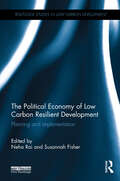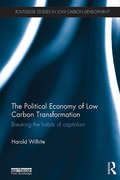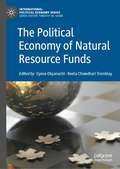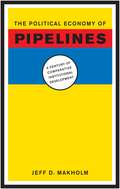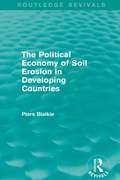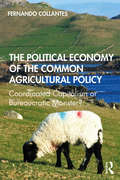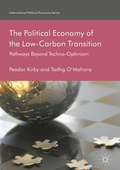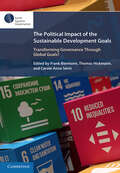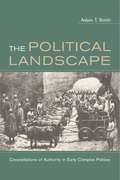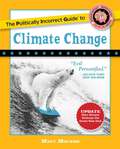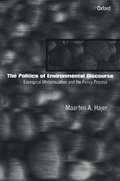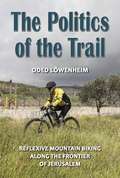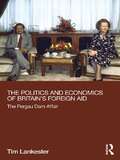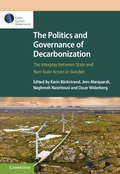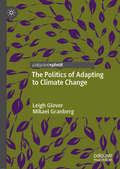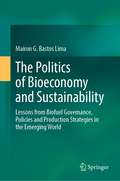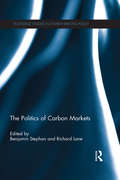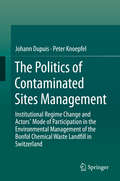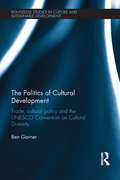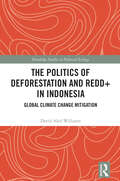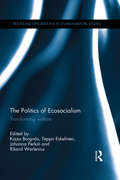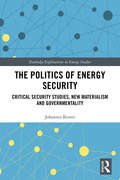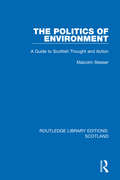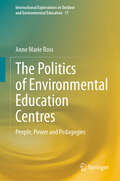- Table View
- List View
The Political Economy of Low Carbon Resilient Development: Planning and implementation (Routledge Studies in Low Carbon Development)
by Susannah Fisher Neha RaiOver the last decade, policies and financing decisions aiming to support low carbon resilient development within the least developed countries have been implemented across several regions. Some governments are steered by international frameworks, such as the UN Framework Convention on Climate Change (UNFCCC), while others take their own approach to planning and implementing climate resilient actions. Within these diverse approaches however, there are unspoken assumptions and normative assessments of what the solutions to climate change are, who the most appropriate actors are and who should benefit from these actions. This book examines the political economy dynamics or the underlying values, knowledge, discourses, resources and power relationships behind decisions that support low carbon resilient development in the least developed countries. While much has been written on the politics of climate change, this book will focus on the political economy of national planning and the ways in which the least developed countries are moving from climate resilient planning to implementation. The book will use empirical evidence of low carbon resilient development planning in four countries: Bangladesh, Ethiopia, Rwanda and Nepal. Different approaches to low carbon resilience are critically analysed based on detailed analysis of key policy areas. This book will be of great interest to policy makers, practitioners’ students and scholars of climate change and sustainable development.
The Political Economy of Low Carbon Transformation: Breaking the habits of capitalism (Routledge Studies in Low Carbon Development)
by Harold WilhiteDeep reductions in energy use and carbon emissions will not be possible within political economies that are driven by the capitalist imperatives of growth, commodification and individualization. As such, it has now become necessary to understand the relationship between capitalism and the emergence of high energy habits. Using the examples of home energy, transport and food, The Political Economy of Low Carbon Transformation articulates the relationship between the politics of economic expansion and the formation of high-energy habits at the level of family and household. The book elaborates a theory of habit and how it can contribute to this relationship. It critiques mainstream green economy and green energy prescriptions for low carbon transformation that take economic growth for granted and ignore habits formed in a material world designed and built for high energy use. The book explores the growing number of communities around the world that are engaged in collaborative efforts to reform their community and household habits in ways that are less environmentally intrusive. It assesses their potential to make an impact on national and urban low carbon political agendas. The book is aimed at a large and growing interdisciplinary audience interested in the relationship between political economy, consumption and sustainability.
The Political Economy of Natural Resource Funds (International Political Economy Series)
by Reeta Chowdhari Tremblay Eyene OkpanachiThis book aims to foster a better understanding of the particular challenges faced by resource-dependent countries or jurisdictions in managing their resource revenues through natural resource funds (NRFs). It explores the varieties of natural resource management strategies as dictated primarily by domestic politics, and how the potential negative distributional consequences of resource wealth management (the resource curse) may add political dimensions and potential conflicts to decisions about NRFs in ways that other sovereign wealth funds (SWFs) do not experience.By bridging the existing academic and practical knowledge gap arising from the limited attention given to the domestic politics of NRFs and state-society relations, this edited book is a valuable resource for academics, policymakers, and civil society actors in resource-driven economies and especially those interested in learning from comparative experiences of natural resource wealth management through NRFs.
The Political Economy of Pipelines: A Century of Comparative Institutional Development
by Makholm Jeff D.With global demand for energy poised to increase by more than half in the next three decades, the supply of safe, reliable, and reasonably priced gas and oil will continue to be of fundamental importance to modern economies. Central to this supply are the pipelines that transport this energy. And while the fundamental economics of the major pipeline networks are the same, the differences in their ownership, commercial development, and operation can provide insight into the workings of market institutions in various nations. Drawing on a century of the world's experience with gas and oil pipelines, this book illustrates the importance of economics in explaining the evolution of pipeline politics in various countries. It demonstrates that institutional differences influence ownership and regulation, while rents and consumer pricing depend on the size and diversity of existing markets, the depth of regulatory institutions, and the historical structure of the pipeline businesses themselves. The history of pipelines is also rife with social conflict, and Makholm explains how and when institutions in a variety of countries have controlled pipeline behavior--either through economic regulation or government ownership--in the public interest.
The Political Economy of Soil Erosion in Developing Countries
by Piers BlaikieFirst published in 1985. This book examines wide variety of ways in which environmental deterioration, in particular soil erosion, can be viewed and the implicit political judgements that often inform them. Using the context of developing countries, where the effects tend to be more acute due to underdevelopment and climatic factors, this work aims to examine this source of uncertainty and make explicit the underlying assumptions in the debate about soil erosion. It also rejects the notion that soil erosion is a politically neutral issue and argues that conservation requires fundamental social change. This title will be of interest to students of environmental and developmental studies.
The Political Economy of the Common Agricultural Policy: Coordinated Capitalism or Bureaucratic Monster?
by Fernando CollantesWhat is the balance of the European Union’s Common Agricultural Policy more than half a century after its birth? Does it illustrate the virtues of the European model of coordinated capitalism, as opposed to US-style liberal capitalism? Or is it an incoherent set of instruments that exert diverse negative impacts and, like Frankenstein’s monster, seems to have escaped the control of its designers? The Political Economy of the Common Agricultural Policy does not criticize the CAP from the liberal standpoint that views most public interventions in the economy as bad for efficiency and welfare. The CAP has been costly to Europeans, both as consumers and as taxpayers, and has also generated a number of negative impacts upon third countries, but these costs and impacts have been more moderate than is suggested. This book proposes that the issue with the CAP is not a generic problem of coordinating capitalism but, instead, a more specific problem of low-quality coordination. The text argues that profound reform of the European Union’s institutions and policies is required to counter the rapid rise of a more Eurosceptical state of mind but – in the case of agricultural policy – history casts serious doubts on the capacity of the European network of agriculture-related politicians to lead such a reform. This key work is essential reading for researchers, graduate students, and master’s level docents of the Common Agricultural Policy and – more broadly – European Union policy and reform.
The Political Economy of the Low-Carbon Transition
by Peadar Kirby Tadhg O’mahonyThis book addresses the global need to transition to a low-carbon society and economy by 2050. The authors interrogate the dominant frames used for understanding this challenge and the predominant policy approaches for achieving it. Highlighting the techno-optimism that informs our current understanding and policy options, Kirby and O'Mahony draw on the lessons of international development to situate the transition within a political economy framework. Assisted by thinking on future scenarios, they critically examine the range of pathways being implemented by both developed and developing countries, identifying the prevailing forms of climate capitalism led by technology. Based on evidence that this is inadequate to achieve a low-carbon and sustainable society, the authors identify an alternative approach. This advance emerges from community initiatives, discussions on postcapitalism and debates about wellbeing and degrowth. The re-positioning of society and environment at the core of development can be labelled "ecosocialism" - a concept which must be tempered against the conditions created by Trumpism and Brexit.
The Political Impact of the Sustainable Development Goals: Transforming Governance Through Global Goals?
by Frank Biermann Thomas Hickmann Carole-Anne SénitWritten by an international team of over sixty experts and drawing on over three thousand scientific studies, this is the first comprehensive global assessment of the political impact of the Sustainable Development Goals, which were launched by the United Nations in 2015. It explores in detail the political steering effects of the Sustainable Development Goals on the UN system and the policies of countries in the Global North and Global South; on institutional integration and policy coherence; and on the ecological integrity and inclusiveness of sustainability policies worldwide. This book is a key resource for scholars, policymakers and activists concerned with the implementation of the Sustainable Development Goals, and those working in political science, international relations and environmental studies. It is one of a series of publications associated with the Earth System Governance Project. For more publications, see www.cambridge.org/earth-system-governance. This title is also available as Open Access on Cambridge Core.
The Political Landscape: Constellations of Authority in Early Complex Polities
by Adam T. SmithHow do landscapes--defined in the broadest sense to incorporate the physical contours of the built environment, the aesthetics of form, and the imaginative reflections of spatial representations--contribute to the making of politics? Shifting through the archaeological, epigraphic, and artistic remains of early complex societies, this provocative and far-reaching book is the first systematic attempt to explain the links between spatial organization and politics from an anthropological point of view. The Classic-period Maya, the kingdom of Urartu, and the cities of early southern Mesopotamia provide the focal points for this multidimensional account of human polities. Are the cities and villages in which we live and work, the lands that are woven into our senses of cultural and personal identity, and the national territories we occupy merely stages on which historical processes and political rituals are enacted? Or do the forms of buildings and streets, the evocative sensibilities of architecture and vista, the aesthetics of place conjured in art and media constitute political landscapes--broad sets of spatial practices critical to the formation, operation, and overthrow of polities, regimes, and institutions? Smith brings together contemporary theoretical developments from geography and social theory with anthropological perspectives and archaeological data to pursue these questions.
The Politically Incorrect Guide to Climate Change (The\politically Incorrect Guides)
by Marc MoranoLess freedom. More regulation. Higher costs. Make no mistake: those are the surefire consequences of the modern global warming campaign waged by political and cultural elites, who have long ago abandoned fact-based science for dramatic fearmongering in order to push increased central planning. The Politically Incorrect Guide to Climate Change gives a voice -- backed by statistics, real-life stories, and incontrovertible evidence -- to the millions of "deplorable" Americans skeptical about the multibillion dollar "climate change" complex, whose claims have time and time again been proven wrong.
The Politics Of Environmental Discourse: Ecological Modernization And The Policy Process
by Maarten A. HajerDr Hajer's path-breaking study opens the way for a better understanding of the environmental conflict, showing how language can be seen to shape our view of what environmental politics is really about and how those perceptions can differ between countries. The author identifies the emergence and increasing political importance of 'ecological modernization' as a new concept in the language of environmental politics. This concept, which has come to replace the antagonistic debates of the 1970s, stresses the opportunities of environmental policy for modernizing the economy and stimulating the technological innovation. Combining abstract social theory with detailed empirical analysis, Martin Hajer illustrates the social and political dynamics of ecological modernization in a detailed analysis of the acid rain controversies in Great Britain and the Netherlands. He concludes by reflecting on the institutional challenge of the environmental politics in the years to come.
The Politics Of The Trail: Reflexive Mountain Biking Along The Frontier Of Jerusalem
by Oded LowenheimEach day, as Oded Löwenheim commutes by mountain bike along dirt trails and wadis in the hills of Jerusalem to Hebrew University, he feels a strong emotional connection to his surroundings. But for him this connection also generates, paradoxically, feelings and emotions of confusion and estrangement. In The Politics of the Trail, Löwenheim confronts this tension by focusing on his encounters with three places along the trail: the separation fence between Israel and the Palestinians; the ruins of the Palestinian village Qalunya, demolished in 1948; and the trail connecting the largest 9/11 memorial site outside the U. S. with a top-secret nuclear-proof bunker for the Israeli cabinet. He shares the stories of the people he meets along the way and considers how his own subjectivity is shaped by the landscape and culture of conflict. Moreover, he deconstructs, challenges, and resists the concepts and institutions that constitute such a culture and invites conversation about the idea of conflict as a culture.
The Politics and Economics of Britain's Foreign Aid: The Pergau Dam Affair (Routledge Explorations in Development Studies)
by Tim LankesterThe Pergau dam in Malaysia was the most controversial project in the history of British aid. Because of its high cost, it was a poor candidate for aid funding. It was provided in part to honour a highly irregular promise of civil aid in connection with a major arms deal. After two parliamentary inquiries and intense media coverage, in a landmark judgement the aid for Pergau was declared unlawful. Tim Lankester offers a detailed case study of this major aid project and of government decision-making in Britain and Malaysia. Exposing the roles played by key politicians and other stakeholders on both sides, he analyses the background to the aid/arms linkage, and the reasons why the British and Malaysian governments were so committed to the project, before exploring the response of Britain’s Parliament, and its media and NGOs, and the resultant legal case. The main causes of the Pergau debacle are carefully drawn out, from conflicting policy agendas within the British government to the power of the business lobby and the inability of Parliament to provide any serious challenge. Finally, Lankester asks whether, given what was known at the time and what we know now, he and his colleagues in Britain’s aid ministry were correct in their objections to the project. Pergau is still talked about as a prime example of how not to do aid. Tim Lankester, a key figure in the affair, is perfectly placed to provide the definitive account. At a time when aid budgets are under particular scrutiny, it provides a cautionary tale.
The Politics and Governance of Decarbonization: The Interplay between State and Non-State Actors in Sweden
by Jens Marquardt Karin Bäckstrand Naghmeh Nasiritousi Oscar WiderbergThis book examines how, and under what conditions, states – in collaboration with societal actors – can govern a societal transformation towards large-scale decarbonization in line with the goals of the Paris Agreement. It advances an innovative analytical framework on how the state governs through collaborative climate governance to foster cooperation, deliberation, and consensus between state and non-state actors. The book focuses on Sweden, which aims to become a fossil-free state. Chapters analyse Sweden's progress towards net zero; its role in international climate governance; and how the COVID-19 pandemic affected climate networks. Providing valuable policy insights for other countries endeavoring to decarbonize, this is a useful reference for graduate students and researchers in climate governance, political science, and international relations. This is one of a series of publications associated with the Earth System Governance Project. For more publications, see www.cambridge.org/earth-system-governance. This title is also available as Open Access on Cambridge Core.
The Politics of Adapting to Climate Change
by Mikael Granberg Leigh GloverThis book examines the political themes and policy perspectives related to, and influencing, climate change adaptation. It provides an informed primer on the politics of adaptation, a topic largely overlooked in the current scholarship and literature, and addresses questions such as why these politics are so important, what they mean, and what their implications are. The book also reviews various political texts on adaptation.
The Politics of Bioeconomy and Sustainability: Lessons from Biofuel Governance, Policies and Production Strategies in the Emerging World
by Mairon G. Bastos LimaThis book addresses the underexposed political dimensions of bioeconomy promotion. Who wins and who loses? How are institutions being shaped, and by whom? Drawing from experiences since the earlier days of biofuels promotion, it explores in unprecedented detail the global drive away from fossil fuels and towards a biomass-based economy.Multipurpose agriculture gains ever more traction as countries create new bio-based value chains – or, rather, value webs. Governance, in this regard, proves to be key for steering developments towards inclusive agri-food-biomass systems instead of fueling just a handful of “flex crops” ridden with social equity and other environmental issues.Based on a rich global-level analysis of bioeconomy promotion and three in-depth case studies of key emerging economies (Brazil, India and Indonesia), the book also innovatively examines sustainability politics in Global South democracies.Ultimately, this book is about finding the politics for a fairer bioeconomy in the years and decades to come.
The Politics of Carbon Markets (Routledge Studies in Environmental Policy)
by Richard Lane Benjamin StephanThe carbon markets are in the middle of a fundamental crisis - a crisis marked by collapsing prices, fleeing actors, and ever increasing greenhouse gas levels. Yet carbon trading remains at the heart of global attempts to respond to climate change. Not only this, but markets continue to proliferate - particularly in the Global South. The Politics of Carbon Markets helps to make sense of this paradox and brings two urgently needed insights to the analysis of carbon markets. First, the markets must be understood in relation to the politics involved in their development, maintenance and opposition. Second, this politics is multiform and pervasive. Implementation of new techniques and measuring tools, policy development and contestation, and the structuring context of institutional settings and macro-social forces all involve a variety of political actors and create new forms of political agency. The contributions study the total extent of the carbon markets, from their prehistory to their contemporary expansion and wider impacts. This wide-ranging political perspective on the carbon markets is invaluable to those studying and interested in ecological markets, climate change governance and environmental politics.
The Politics of Climate Change and Uncertainty in India (Pathways to Sustainability)
by Lyla MehtaThis book brings together diverse perspectives concerning uncertainty and climate change in India. Uncertainty is a key factor shaping climate and environmental policy at international, national and local levels. Climate change and events such as cyclones, floods, droughts and changing rainfall patterns create uncertainties that planners, resource managers and local populations are regularly confronted with. In this context, uncertainty has emerged as a "wicked problem" for scientists and policymakers, resulting in highly debated and disputed decision-making. The book focuses on India, one of the most climatically vulnerable countries in the world, where there are stark socio-economic inequalities in addition to diverse geographic and climatic settings. Based on empirical research, it covers case studies from coastal Mumbai to dryland Kutch and the Sundarbans delta in West Bengal. These localities offer ecological contrasts, rural–urban diversity, varied exposure to different climate events, and diverse state and official responses. The book unpacks the diverse discourses, practices and politics of uncertainty and demonstrates profound differences through which the "above", "middle" and "below" understand and experience climate change and uncertainty. It also makes a case for bringing together diverse knowledges and approaches to understand and embrace climate-related uncertainties in order to facilitate transformative change. Appealing to a broad professional and student audience, the book draws on wide-ranging theoretical and conceptual approaches from climate science, historical analysis, science, technology and society studies, development studies and environmental studies. By looking at the intersection between local and diverse understandings of climate change and uncertainty with politics, culture, history and ecology, the book argues for plural and socially just ways to tackle climate change in India and beyond.
The Politics of Contaminated Sites Management
by Johann Dupuis Peter KnoepfelBy the end of the 1970s, contaminated sites had emerged as one of the most complex and urgent environmental issues affecting industrialized countries. The authors show that small and prosperous Switzerland is no exception to the pervasive problem of sites contamination, the legacy of past practices in waste management having left some 38,000 contaminated sites throughout the country. This book outlines the problem, offering evidence that open and polycentric environmental decision-making that includes civil society actors is valuable. They propose an understanding of environmental management of contaminated sites as a political process in which institutions frame interactions between strategic actors pursuing sometimes conflicting interests. In the opening chapter, the authors describe the influences of politics and the power relationships between actors involved in decision-making in contaminated sites management, which they term a "wicked problem. " Chapter Two offers a theoretical framework for understanding institutions and the environmental management of contaminated sites. The next five chapters present a detailed case study on environmental management and contaminated sites in Switzerland, focused on the Bonfol Chemical Landfill. The study and analysis covers the establishment of the landfill under the first generation of environmental regulations, its closure and early remediation efforts, and the gambling on the remediation objectives, methods and funding in the first decade of the 21st Century. The concluding chapter discusses the question of whether the strength of environmental regulations, and the type of interactions between public, private, and civil society actors can explain the environmental choices in contaminated sites management. Drawing lessons from research, the authors debate the value of institutional flexibility for dealing with environmental issues such as contaminated sites.
The Politics of Cultural Development: Trade, cultural policy and the UNESCO Convention on Cultural Diversity (Routledge Studies in Culture and Sustainable Development)
by Ben GarnerThere is a growing recognition of the role that culture can play in sustainable development strategies. This development has generally been welcomed, but also raises a number of questions: What are the implications in policy and practice? Who are the most influential voices in promoting a global agenda for culture and development, and to what extent has the creation of new international policy instruments reflected a consensus? More fundamentally, what is meant by "culture" in these discussions and who has the power to give particular definitions political and legal authority? The Politics of Cultural Development seeks to provide a theoretically and historically informed response to such questions, illustrated by reference to case studies (including the European Union, the Caribbean and China). Particular attention is paid to the formation of the UNESCO Convention on the Protection and the Promotion of the Diversity of Cultural Expressions, a landmark instrument in debates about culture and development. The book goes on to explore some of the practical implications that this international treaty is beginning to have for the ways that culture is (and is not) being integrated into contemporary development policy and practice. This book will be useful for students, academics and policymakers in the fields of international development, international relations, international political economy, cultural policy and cultural theory.
The Politics of Deforestation and REDD+ in Indonesia: Global Climate Change Mitigation (Routledge Studies in Political Ecology)
by David Aled WilliamsThis book reflects on Indonesia’s recent experience with REDD+ (Reducing Emissions from Deforestation and forest Degradation), all set within a broader discussion of neoliberal environmentalism, hyper-capitalism, and Indonesian carbon politics. Drawing on the author’s political ethnographic fieldwork conducted in Jakarta, Central Sulawesi, and Oslo, where the author examined Norway’s interests and role in implementing REDD+, this book discusses the long evolution of the idea that foreign state and private financing can be used to protect tropical forests and the carbon stored within them, resulting in both local economic development and global climate benefits. It shows how neoliberal environmental approaches to climate change, of which REDD+ is a leading example, increase the severity of political contestations that must be overcome to reach global climate mitigation goals, and how recent incarnations of REDD+ have tended to forget earlier scholarly advice to couple anti-deforestation approaches with policies that reduce industrial carbon emissions. In Indonesia, tectonic political and economic forces are shown to have negatively impacted REDD+ implementation. Using a political ecology approach, the book links the literature on REDD+ with that covering Indonesia’s recent democratic regression, highlighting how the country’s environmental performance is inextricably linked to the timbre of its political governance. Given the severity of the political contestations that must be overcome to reach its stated goals, REDD+ cannot replace global policies that drastically reduce industrial carbon emissions. This book will be of great interest to students and scholars of political ecology, deforestation, climate change, environmental politics, natural resource management, and environmental conservation.
The Politics of Ecosocialism: Transforming welfare (Routledge Explorations in Environmental Studies)
by Kajsa Borgnäs Teppo Eskelinen Johanna Perkiö Rikard WarleniusAs the global economy seeks to recover from the financial crisis and warnings about the consequences of climate change abound, it is clear that we need a fundamentally new approach to tackle these issues. This innovative book offers a unique perspective, stressing the necessity of both ecological and social change as it discusses how to create a "red-green" or "eco-socialist" society. Examining the current crises of welfare capitalism as well as the challenges and conflicts of an eco-socialist society, the book proposes a new social order that would combine the ideals of egalitarianism and of environmental sustainability. It analyses the key social and ecological issues related to the welfare state, including green Keynesianism, ecological Marxism, the limits of growth and no-growth, capitalist barriers to a renewable energy transition, proposals for a universal basic income and the role of technology. Finally, the book outlines possible paths of transformation towards creating an eco-socialist society, drawing out lessons that can be applied internationally. This book will be of great interest to students and researchers in economics, environmental studies and political science.
The Politics of Energy Security: Critical Security Studies, New Materialism and Governmentality (Routledge Explorations in Energy Studies)
by Johannes KesterEnergy security is known for its ‘slippery’ nature and subsequent broad range of definitions. Instead of another attempt to grasp its essence, this book offers a critical reflection that problematizes the use of energy security itself. After a short historical and methodological analysis of the proliferation of energy security, The Politics of Energy Security unpacks three social practices that drive energy security. These include an analysis of the logics of security, a study of the relation between the materiality of sociotechnical (energy) systems and the knowledge people have over such systems, and a reflection on the power and politics behind (energy) security. Each of these are discussed and ultimately illustrated in the last chapter to show how energy security works, how it is shaped and what role it plays within political processes. Based on a novel performative reading of energy security with its focus on ontological politics and an in-depth look at the often implicitly accepted social practices that determine how people shape and are shaped by energy security, this book will be of great interest to students and scholars of energy security and policy, political theory, international relations, critical security studies, and environmental studies more broadly.
The Politics of Environment: A Guide to Scottish Thought and Action (Routledge Library Editions: Scotland #28)
by Malcolm SlesserOriginally published in 1972 and ahead of its time in many respects this book was the first to take a constructive approach to the problems facing the human race in the 20th Century. It remains enduringly relevant today and discusses over-population, under-employment, atmospheric pollution, exhaustion of global resources and geo-politics. It shows how all these issues are inter-connected and therefore how conventional attempts to solve some of them merely exacerbate others. It asserts that the solution rests in the evolution of a realistic form of politics which puts the community first.
The Politics of Environmental Education Centres: People, Power and Pedagogies (International Explorations in Outdoor and Environmental Education #17)
by Anne Marie RossThis book juxtaposes a representation of environmental education centres around the globe with centres within the New South Wales Department of Education in Australia. As terminology shifted from nature study and conservation education to environmental education then “environmental and sustainability education” within “sustainable development” the centres embodied and encompassed this evolution. The book traces the centres’ journeys through the phenomenon of the 1970s growth in socially conscious governance, to 1980s-1990s public managerialism, to the tightening tentacles of capitalism. The complexity of education as a socio-political endeavour is made explicit. Themes including the changing dynamics of caring for the environment, and bureaucratic and political manoeuvring, in addition to the effects of activism and globalisation are viewed through a centre lens as the centres survive and thrive in ever increasing neoliberal times. The book will appeal to teachers, academics and bureaucrats interested in the history and politics of environmental education.
